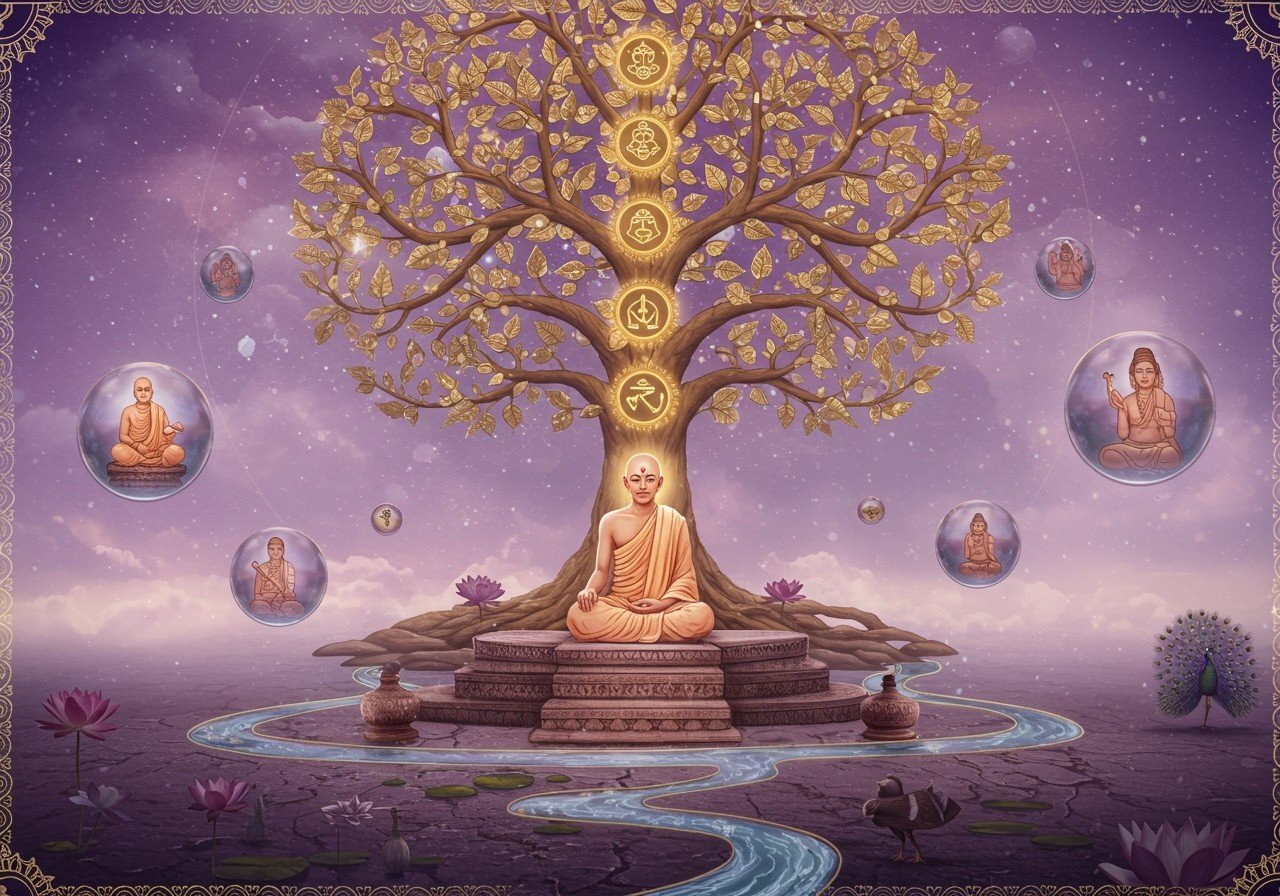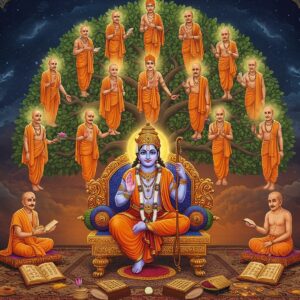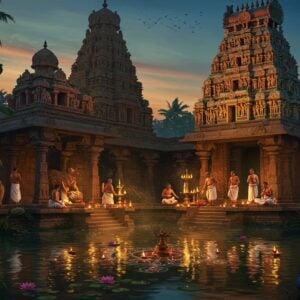
Ajivika philosophy, an ancient Indian spiritual tradition originating around the 5th century BCE, presents a unique perspective with its emphasis on determinism and a fixed cosmic order. Founded by Makkhali Gosala, it offers compelling insights into the nature of reality and the human condition. Despite its historical significance, Ajivika remains relatively less known compared to its contemporaries, Buddhism and Jainism.
Historical Context: The Rise of Ajivika
Ajivika emerged during a period of intense spiritual and intellectual ferment in ancient India, coinciding with the Shramana movement. This era witnessed a surge of new spiritual ideas and practices, challenging the established Vedic traditions. Ajivikas, along with other Shramana traditions like Buddhism and Jainism, sought alternative paths to spiritual liberation. Their interactions with these contemporary spiritual movements, sometimes marked by contention and debate, played a crucial role in shaping their doctrines and practices. Explore Hinduism, another major spiritual path in India.
Core Beliefs and Practices of Ajivika
Central to Ajivika philosophy is the concept of niyati, or destiny. This deterministic worldview posits that all events in life are predetermined by an inexorable cosmic order. This naturally raises questions about free will and the role of human agency. In stark contrast to Buddhism and Jainism which emphasize karma and individual action, Ajivikas focused on the inevitable unfolding of fate. They believed that true spiritual peace comes from understanding and accepting this cosmic order. Their philosophy also includes a unique understanding of the soul’s journey toward liberation, distinct from the cyclical rebirth emphasized in other Indian traditions.
Ajivikas were also known for their rigorous asceticism, practicing extreme austerities such as fasting, celibacy, and renunciation of material possessions. This was seen as a path to break free from the cycle of samsara and achieve liberation.
Ajivika’s Influence on Indian Culture and Spirituality
Despite its eventual decline, Ajivika left a lasting legacy on Indian thought and culture. Their rigorous ascetic practices and monastic traditions influenced other spiritual movements in India. Moreover, the Ajivikas were patrons of art and architecture, as evidenced by the Barabar and Nagarjuni caves, with their polished interiors and ancient inscriptions, reflecting the Ajivika influence. Their unique deterministic philosophy left its subtle marks on later Hindu and Jain philosophies. Even though Ajivikas are not a prominent sect today, their philosophical musings on fate and destiny continue to resonate in various aspects of Indian culture, from literature to folklore.
Ajivika in Historical Records and Literature
References to Ajivikas appear in ancient texts, often within critical contexts, particularly in Buddhist and Jain scriptures, which sometimes portray them as rivals. These texts, however, offer valuable insights into their beliefs and practices. Emperor Ashoka’s edicts also mention Ajivikas, indicating their presence and influence within society during his reign. Reconstructing a complete picture of Ajivika history is challenging due to the scarcity of primary textual sources. However, archaeological discoveries, such as inscriptions in caves, provide glimpses into their world and beliefs. More research can reveal further aspects of their intriguing history.
The Decline and Enduring Legacy of Ajivika
Ajivika philosophy gradually declined in prominence, eclipsed by the rise of Buddhism and Jainism. Political shifts and changing social dynamics further contributed to their dwindling influence. Nevertheless, their legacy persists. Scholars today recognize the importance of studying Ajivika to gain a comprehensive understanding of the diverse spiritual landscape of ancient India. Explore how other historical texts have shaped Indian culture.
Ajivika’s emphasis on destiny and the cosmic order continues to resonate within Indian culture, influencing literature, art, and even contemporary thought. Their unique contribution to Indian spiritual thought reminds us of the rich tapestry of philosophical perspectives that have shaped the subcontinent’s intellectual and spiritual heritage.
How Poojn.in Can Support Your Spiritual Journey
Poojn.in offers a wide selection of products to support your exploration of Indian spiritual traditions. Discover authentic ritual items, including pure herbs, ayurvedic ingredients, and sacred objects for ceremonies. Enhance your worship space with decorative items and holy utensils. Explore our collection of Ayurvedic herbs, holy cosmetics, and sacred clothing for your spiritual well-being. Check out our Sarbosadhi collection and explore our Mahosadhi selection for traditional practices. Green Mung Dal is also available for your rituals.
At poojn.in, we are committed to providing a convenient and reliable shopping experience. Our easy-to-use online platform offers pan-India delivery and expert guidance. We verify the authenticity of all our products, ensuring you receive quality items for your spiritual practices.
Visit www.poojn.in to explore our complete range of spiritual and religious products.
Frequently Asked Questions About Ajivika
What is Ajivika philosophy? Ajivika is an ancient Indian philosophy centered on the concept of niyati (destiny), asserting that all events are predetermined by a fixed cosmic order. It stands apart from other contemporary schools of thought like Buddhism and Jainism by its emphasis on determinism.
Why is Ajivika important in Indian culture? While not a major religion today, Ajivika played a significant role in ancient Indian philosophical discourse, challenging prevailing orthodoxies and contributing to the development of diverse perspectives. Its emphasis on fate and acceptance continues to resonate in Indian culture.
How did Ajivika impact spirituality in India? Ajivika contributed to Indian spirituality through its unique perspective on the soul’s journey and its emphasis on ascetic practices as a means of liberation. Its ideas sparked dialogues and debates with other spiritual traditions, influencing their development.
What are Ajivika caves? Ajivika caves are rock-cut caves used by Ajivika monks as monasteries. These caves, featuring polished interiors and inscriptions, serve as historical and architectural testaments to the Ajivika presence in ancient India. You can Explore how other faiths like Hinduism have influenced Indian art.
Is Ajivika still practiced today? Although Ajivika is not practiced as a living religion today, its legacy continues to influence Indian culture and provides valuable insights for scholars studying ancient Indian thought. Its concepts of fate and destiny still resonate in various forms.
Conclusion: Embracing the Legacy of Ajivika
Ajivika philosophy offers a distinctive lens through which to view the complexities of life and the human condition. Its deterministic worldview encourages reflection on fate, destiny, and the nature of existence. Though not a prominent spiritual tradition today, Ajivika’s influence on Indian culture and spirituality remains a testament to its enduring legacy. Explore Ajivika’s unique perspective and gain a richer appreciation for the diverse tapestry of ancient Indian thought.


